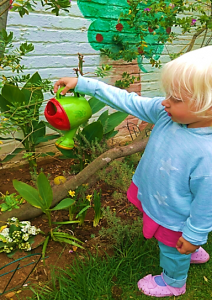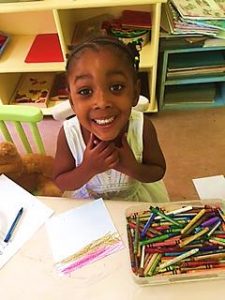Written by Julia Gorham.
How do we create independent, confident children? Montessori has some practical guidelines we can use.
- Let your child have real things. Take time to show him/her how to handle objects with care. This builds self-esteem and independence as well as concentration, coordination and responsibility.
- When you teach your child new skills, break it down into small, precise steps. “Clean your room” is overwhelming; show the child how to organize a specific shelf, item or area.
- Respect the child’s slower sense of time and allow the child time to do a task without hurrying. Give your child choices: If your child refuses to co-operate, pull out the creative choices. If they need to put their shoes on, and this is not a choice, make it into one: “Do you want to put on this shoe or that shoe?”. If your child is being picky and it seems if he will not eat say “Do you want to eat breakfast now, or wait for snack at school?” or ‘would you like Weetbix or scrambled eggs?” Again be firm with your choices, letting your child know that these are the only choices available. He/she may choose not to choose at all, in which case you may choose for them. “Do you want to choose your own breakfast or would you like me to choose for you?” In most cases, they enjoy choosing for themselves and will prefer this to your choice.
- Resist always helping your child. Any unnecessary help interferes with learning. Children should be allowed to help themselves as much as possible, including dressing and undressing themselves, putting away their own things etc. A child is far more capable than one may realise and this builds self-esteem and independence. Dr Montessori stated, “Any unnecessary aid is a hindrance to learning.”
- Spills, mistakes and frustration are opportunities for learning. Let the child handle its own problems as much as possible. E.g. give your child a cloth to clean his own spills. (Always step in, however, if someone may be hurt)
- The child needs to repeat activities often even after it appears to be mastered. Also remember improvement comes with practice.
- Remind your child to clean up or put away immediately following activity. It is important that your child learns to finish one thing before moving on.
- Make discipline interesting. “See how quietly you can close the door.” Rather than “Don’t slam the door!” Positive language is important.
- Use precise language when speaking to the child. Concise speech and new vocabulary assist the child in expressing himself/her and the power of clear communication.
 Don’t try to improve any activity your child has done while she/he is watching. Next time show the child first.
Don’t try to improve any activity your child has done while she/he is watching. Next time show the child first.- Don’t interrupt your child while he/she is concentrating.
- When the child plays on the floor, supply the child with a rug or towel for activity to be placed on. This shows ownership of space and is more manageable to clean up.
- Encourage washing after using the bathroom, wiping nose and before eating.
- Remind your child to clean up or put away immediately following an activity. It is important to finish one thing before moving on.
- Be consistent with requests and expectations.
- Read to your child every day.
What else do you do with your child to create independence?




